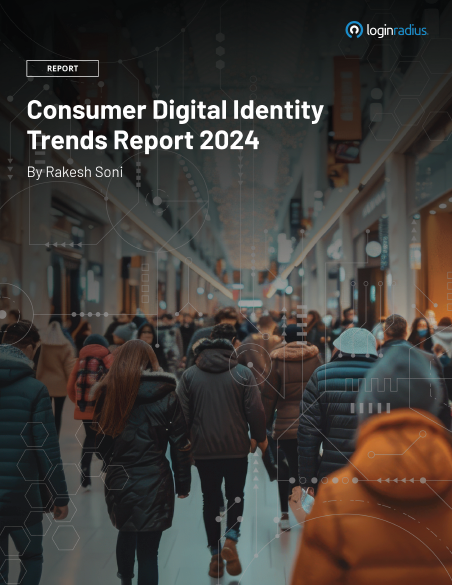Introduction
The modern digital business landscape ensures a rich consumer experience that keeps customers loyal. However, that’s not the only way to earn trust; the critical role of digital trust in adequate security can’t be overlooked.
Statistics reveal that around 1,387,615 identity theft complaints were filed in the United States in 2020. And these numbers are rising exponentially every year.
Businesses must reinforce their overall information security infrastructure, ensuring that crucial business information and customer details are secure.
Whether we discuss securing access control or rethinking privacy policies, businesses skipping a small step in protecting customer information could lead to losses worth millions of dollars and reputational damages.
Apart from this, cybercriminals are hunting for customer identities that can be impersonated to steal sensitive business information, which can be further exploited for financial benefits.
Undoubtedly, investing in secure experiences isn’t a luxury anymore; it’s necessary for businesses offering online services through a website or a mobile application.
Let’s uncover aspects of digital trust and where businesses need to invest to earn digital trust in 2022 and beyond.
Why Does Digital Trust Matter Now More than Ever Before?
Today, the competition in every niche is neck-to-neck. And customers have endless options to choose from. Hence, businesses must ensure they aren’t losing a single potential customer because of poor information security hygiene.
Besides, global data privacy and security regulations are becoming more stringent. If an organization isn’t complying with privacy and security regulations, including the GDPR and the CCPA, it’ll have to face penalties and reputational damages.
Also, if a business faces any kind of data breach or customer identity theft, they’ll lose trust in their clients and potential clients. And this isn’t good from a business growth perspective.
In a nutshell, any loophole in managing customer information can adversely impact customer loyalty, brand equity, and financial performance.
Hence, it is essential to ensure digital trust in customers/users sharing their details.
How Can Businesses Earn Digital Trust?
Earning digital trust isn’t a piece of cake. Businesses should understand that their customers always expect a great user experience coupled with the assurance of robust security to their personal information.
Here are some information security best practices that can be incorporated into a business to build trust in customers and potential customers.
#1. Multi-factor authentication
Multi-factor authentication (or MFA) is a multi-layered security system that verifies the identity of users for login or other transactions.
The user account will remain secure by leveraging multiple authentication layers, even if one element is damaged or disabled.
Codes generated by smartphone apps, answers to personal security questions, codes sent to an email address, fingerprints, etc., are a few examples of multi-factor authentication implemented in day-to-day scenarios.
On the other hand, multi-factor authentication is considered one of the most efficient ways of providing improved security in recent times. The multiple layers ensure that users demanding access are who they claim to be. Even if cyber criminals steal one credential, they'll be forced to verify identities in another way.
With the world heading toward more criminal sensitivities, using multi-factor authentication as part of your consumer identity and access management (CIAM) platform helps you build and maintain solid consumer trust.
#2. Single sign-on (SSO)
Introducing Single Sign-On (SSO) to your customers can offer greater security and improved usability, which are two of the many critical benefits of SSO.
No one likes remembering credentials. Many use the same username and password, irrespective of the application. They exert a lot of pressure on the memory.
This is where the Single Sign-On technology comes into focus and works like a breeze.
Single Sign-On (SSO) is a method of authentication that allows websites to use other trustworthy sites to verify users. Single sign-on enables users to log in to any independent application with a single ID and password.
SSO is an essential feature of an Identity and Access Management (IAM) platform for controlling access. Verifying user identity is vital when it comes to knowing which permissions a user will have.
The LoginRadius Identity platform is one example of managing access that combines user identity management solutions with SSO solutions.
#3. Risk-Based Authentication (RBA)
Risk-based authentication is a non-static authentication system that considers the profile(IP address, Browser, physical Location, and so on) of a consumer requesting access to the system to determine the risk profile associated with that action.
The risk-based implementation allows your application to challenge the consumer for additional credentials only when the risk level is appropriate.
It is a method of applying various levels of stringency to authentication processes based on the likelihood that access to a given system could result in compromise. As the level of risk increases, the authentication process becomes more complicated and restrictive.
Risk-based authentication is an essential security feature because it works in real-time to prevent cyber frauds like accounts from getting compromised without causing an inconvenience for legitimate consumers. And thus building digital trust.
In Conclusion
In a modern digital world, customers always expect great brand experiences, but that doesn’t mean they’re ready to compromise their sensitive information.
Brands offering robust security mechanisms to protect their customers and sensitive information are always ahead of their competitors.
Hence, businesses embarking on a digital transformation journey shouldn’t underestimate the true potential of a secure platform that promotes digital trust.
The aspects mentioned above could help businesses build digital trust that further fosters growth in the future.















